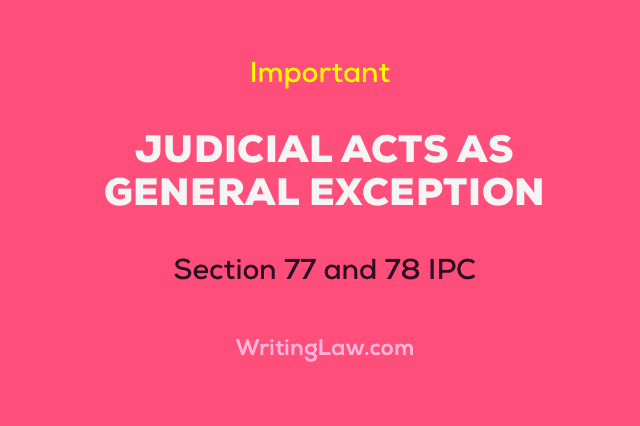
The judicial act is an act that is derived from the ordinary exercise of judicial powers within the reasonable and appropriate jurisdiction. Anything done while acting judicially is not an offence under the Indian Penal Code. Judicial acts as a general exception can be better understood from section 77 and section 78 of IPC. And, the brief discussion about the topic is given below.
Section 77 IPC: Act of judge when acting judicially
Nothing is an offence done by a judge when acting judicially in the exercise of any power that is, or which in good faith he believes to be, given to him by law.
Illustration: A, a judge punishes B with the death penalty. A is not liable for the murder of B because he is protected under section 77, IPC.
Section 77 of IPC grants protection to a judge when he is acting judicially. As per this section, if a judge commits an offence while acting judicially in the exercise of any power given to him by law or in the exercise of any power which he believes to be given to him by law in good faith, he will be able to take the defence under this section.
In other words, it is no offence if a judge commits an act which is an offence in the Indian Penal Code while acting judicially in the exercise of any power provided to him by law or in the exercise of any power which he believes to be provided to him by law in good faith.
However, it is to be noted that the Judge must prove good faith.
Section 77 IPC: Case Law
Megh Raj vs Zakir Hussain (1875)
In this case, the High Court of Allahabad has held that ‘no person acting judicially is liable for an act done or ordered to be done in the discharge of his official duty within the limits of his jurisdiction and in such a case the question of acting in good faith does not arise. The question of good faith is irrelevant only when a judge acts without jurisdiction. But when there is jurisdiction, the immunity extends even to acts which constitute even an abuse of it.‘
Section 78 IPC: Act done pursuant to the judgment or order of court
Nothing which is done in pursuance of, or which is warranted by the judgment or order of a Court of Justice; if done whilst such judgment or order remains in force, is an offence, notwithstanding the court may have had no jurisdiction to pass such judgment or order, provided the person doing the act in good faith believes that the court had such jurisdiction.
Illustration: A, an officer of the court, arrested B, following the court’s order. Here, A has committed no offence.
This section is a result of section 77 of the IPC. This section provides protection to officers acting under the authority of a court’s decision or order of a Court of justice. The section states that if an act is committed at the time of the imposition of a decision or order of a court, it will not be considered an offence, even if the court does not have jurisdiction to pass such a decision. However, the act must be done believing in good faith that the court has such jurisdiction. Under this section, one can plead a mistake of law as a defence.
Section 78 IPC: Case Law
Kapur Chand vs State (1976)
In pursuance of an order of the Magistrate, the accused (husband) had withdrawn the property of his wife from her control without her consent. It was held that the husband had not committed any offence as he was protected under section 78 of the IPC.
- Understanding the Legislative Branch of the Indian Government - 6th May 2024
- Appointment, Oath, and Removal of Constitutional Posts in India - 28th April 2024
- Powers of Income Tax Authorities in India - 26th April 2024







